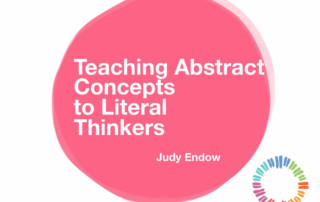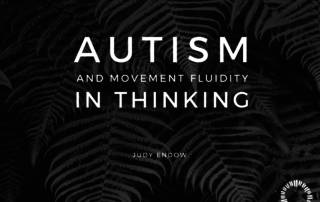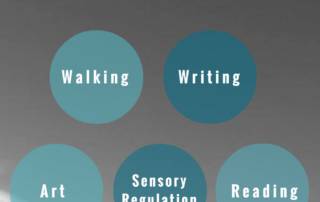The Advantage of Autistic Difference in Visual Perception
Autistic writer, artist and consultant, Judy Endow on autistic difference in visual perception. As a child, people sometimes thought I was stubborn and resistant when I did not want to allow them into my space or to do what they wanted me to do. They did not understand the negative effect they had on me and on my surroundings, and at the time, I did not have the words to explain it. Sensory Information and Perceptions Today I have the words and can explain. I do so in hopes that it might help others who may not yet have their
Teaching Abstract Concepts to Literal Thinkers
Autistic consultant Judy Endow's strategies for teaching abstract concepts to literal thinkers. Teaching Abstract Concepts to Literal Thinkers During the holiday season people are sometimes rushed and frazzled due to the extra activities and expectations of the season. Thus, it is a particularly good time to talk about kindness. Many individuals with autism are literal and concrete thinkers, which can make teaching an abstract concept such as kindness a little tricky. Here are some ways to work with an autistic neurology when teaching the concept of kindness: Identify Acts of Kindness Even though kindness is an abstract concept we can
Autism and Movement Fluidity in Thinking
Autism and Movement Fluidity in Thinking by Judy Endow Unreliable Fluidity in Thinking One of the hardest things about my autism is the unreliable fluidity of my own thinking. Sometimes my thoughts are fluid and sometimes they are not. When my thoughts are fluid I can easily think through task-oriented things such as making a meal, writing an article, or cleaning the house. I can make a mental (or written) list and follow it. I can think of a main idea and sub topics. I can gather supplies and start. When my thoughts are not fluid life is a bit different.
Autism, Social Greetings and Rhetorical Questions
by Judy Endow Autism and Rhetorical Questions Autistic people may not automatically know how to respond to rhetorical social questions such as “How are you?” or automatically reciprocate in social pleasantries such as “good morning.” This is not because they are rude, obnoxious, don’t care, or any of the other assumed reasons people attribute to this behavior. Instead, it is because all social information is not automatically picked up and used by a person with an autistic brain. The autistic brain simply works differently. Even so, autistic people can learn those things their particular brain hasn’t allowed them to automatically
Creating Visuals Instantly for Unpredictable Activities
As an adult with autism, knowing what will happen during each day is important to me. For children, who have much less life experience, it is often a deal breaker in terms of them being able to participate in life around them. Using visual schedules supports this need both at school and on ordinary days at home, but what about those times when life gets hectic or when spontaneity is in order? Why Visuals Work Having an autism neurology means that neither internal regulation (physical, sensory, emotions) nor external regulation (making sense of the world around us) just happens! We







